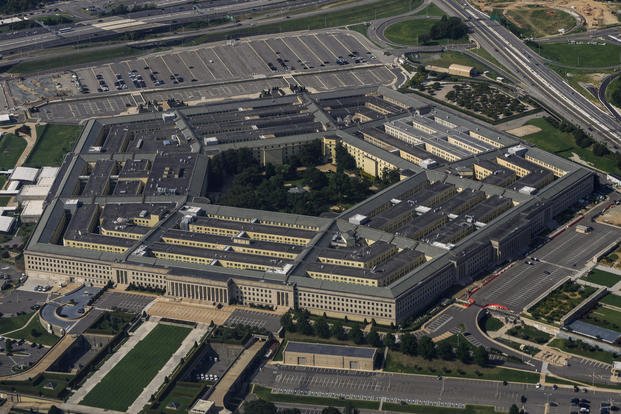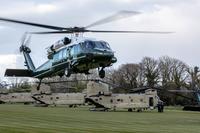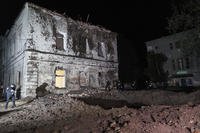WASHINGTON -- The Pentagon said Thursday the U.S. military shot down an armed Turkish drone that came within 500 meters (yards) of American troops in northeastern Syria, in a rare use of force by one NATO member against another.
Air Force Brig. Gen. Patrick Ryder, the Pentagon press secretary, called it a "regrettable incident" and said U.S. troops were forced to go to bunkers for safety as Turkey bombed targets nearby.
Both Defense Secretary Lloyd Austin and the new Joint Chiefs chairman, Gen. CQ Brown, spoke with their Turkish counterparts quickly after the incident to emphasize the value they place on their relationship with Turkey -- but also the need to avoid any similar incidents in the future and ensure the safety of U.S. personnel.
The decision to shoot down an ally's armed drone "was made out of due diligence and the inherent right of self-defense to take appropriate action to protect U.S. forces," Ryder said, adding that "we have no indication that Turkey was intentionally targeting U.S. forces."
U.S. officials earlier told The Associated Press the shootdown was ordered after more than a dozen calls to Turkish military officials stating that U.S. forces were on the ground in the area and that the U.S. military would take action to protect them if the drone didn't leave. The officials spoke on condition of anonymity to provide details of a sensitive military incident.
Ryder said U.S. forces observed Turkish drones doing airstrikes around Hassakeh at about 7:30 a.m. local time, and some strikes were inside a so-called American "restricted operating zone" just a kilometer (about a half mile) from U.S. troops. He said a bit later a Turkish drone reentered the restricted area "on a heading toward where U.S. forces were located."
Commanders determined it was a threat and U.S. F-16 fighter jets shot it down around 11:40 a.m., Ryder said, adding that no U.S. forces were injured.
The incident occurred on the same day as a drone attack killed at least 80 people in government-controlled Homs, Syria, where explosive-laden drones were detonated during a military graduation ceremony attended by young officers and their families. An additional 240 people were injured, according to Syria's health ministry.
Syria's military blamed insurgents "backed by known international forces," without naming any particular group, and threatened to respond with "full force."
Syria has been in a civil war for more than a decade, and the country is split into areas controlled by the Syrian government led by President Bashar al-Assad; al-Qaida-linked militants and Turkish-backed opposition fighters in the northwest; and Kurdish forces in the northeast that the U.S. partners with to conduct missions against the Islamic State group. So far, the war has killed half a million people, wounded hundreds of thousands and left many parts of the country destroyed.
Typically, the U.S. and Turkish militaries, which are NATO allies, work in close coordination in conducting air maneuvers. But Turkey considers the Kurdish forces that work with the American troops to be aligned with the Kurdistan Workers' Party, or PKK.
The U.S. has about 900 troops in Syria conducting missions to counter Islamic State group militants.
There was no immediate comment from Turkey on the shooting of the drone.
The country's state-run Anadolu Agency reported, however, that the Turkish intelligence service, MIT, carried out an operation against the PKK and the Kurdish militia group in Syria, which is known as People's Defense Units, or YPG. The report said the Turks struck suspected arms and ammunition depots and buildings believed to have been used by the groups' "sabotage" teams. It did not provide further details on the operation.
On Wednesday, Turkey had carried out airstrikes in Iraq and Syria against Kurdish militant targets following a suicide attack outside Turkey's interior ministry building earlier this week.
In a press conference following the attack, Turkish Foreign Minister Hakan Fidan said Turkish intelligence officials have established that the two assailants arrived from Syria, where they had been trained. He said Turkey would now target facilities in Syria and Iraq belonging to the PKK or YPG.
Thursday's incident risks adding to longstanding tensions between Turkey and the United States, even though Turkey is a strategically important ally and NATO member. U.S. officials and lawmakers have criticized Turkey's human rights record and its delays in agreeing to Sweden's membership in NATO. Turkey has been frustrated by U.S. delays in approving 40 new F-16 fighter jets as well as kits to upgrade its existing fleet.
Ryder told reporters that the U.S. stands "firmly with our NATO ally Turkey and the Turkish people in their fight against the PKK."
The U.S. has designated the PKK as a "foreign terrorist organization" but has declined to make a similar determination regarding the YPG, which has been a key partner of the U.S. in the fight against the Islamic State group in northern Syria. The U.S. does not believe the YPG represents a threat to Turkey.
As recently as Wednesday, the State Department said there was no change in how the U.S. regards the YPG.
In 2016, Turkish President Tayyip Erdogan accused the U.S. of supporting a failed coup attempt against his government. The U.S. has flatly rejected the claims but has also refused to extradite the leader of the group Erdogan claims was behind the attempt, cleric Fetullah Gulen, who lives in exile in Pennsylvania.
Associated Press writer Suzan Fraser in Ankara, Turkey, contributed.











